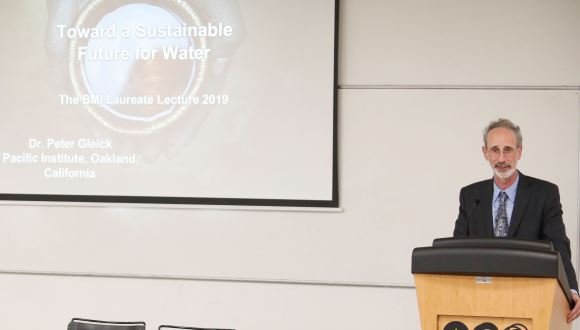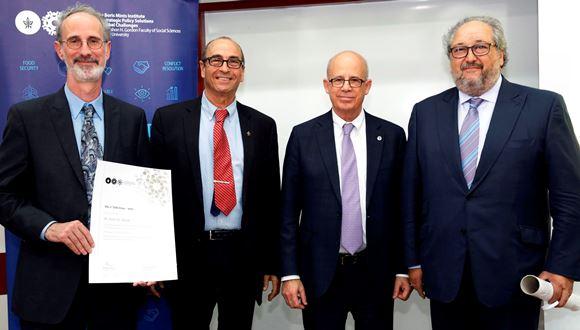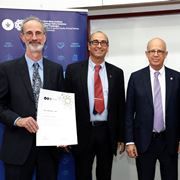TAU Mints Conference Advances Solutions to Urgent Global Concerns
Resolving conflict and increasing the water supply were the topics at the flagship event of TAU’s Boris Mints Institute for Strategic Policy Solutions to Global Challenges (BMI) –the Annual International Academic Conference. The prestigious gathering at the two-day conference included academics, professionals, government and agency officials, industry representatives and media personalities from Israel and around the world.
BMI Head Prof. Itai Sened opened the first session, “The Global Challenge of Conflict Resolution,” explaining that one of the core areas of research at BMI is how to diffuse seemingly intractable conflicts around the globe, if not outright solve them. Arguably, no conflict is more intransigent than the Israelis and Palestinians.
Dr. Sami Miaari, Head of the BMI Conflict Resolution Lab and a leading expert in the economics of political instability, and Dr. Massimiliano Cali, a senior economist at the World Bank Indonesia office, investigated whether there is a correlation between significant increases or decreases in trade, and the intensity of political violence. In his presentation, “Should I trade or Should I go (to war)? Lessons from the Second Intifada,” Dr. Miaari stated: “The results of the study show a negative correlation between the amount of Palestinian exports and the intensity of the conflict.” Simply put, the more trade emanating from the West Bank and Gaza, the more the incentive to reduce violence. “Facilitating trade,” concluded Miaari, “can be an important strategy in reducing the risk of conflict.”
Prof. Daniel Bar-Tal (emer.) of TAU’s Jaime and Joan Constantiner School of Education addressed the psychological and social aspects of political conflicts in his presentation, “The Current State of the Israeli-Palestinian Conflict.” The need for educating young people is critical to breaking the stalemate between two narratives – peace and violence. “The conflict is often classified as intractable and even unsolvable. Each side is solely focused on not losing,” he said. “If and when the population supports peace, the authorities will have no choice but to follow suit.”
Two other presentations followed: “Resolving Intractable Conflicts: Is it About Gender,” by Dr. Nimrod Rosler of TAU’s Department of Public Policy, and “The Political Economy in Conflict Resolution: The Israeli-Palestinian Case,” by doctoral student and BMI Fellow Amit Loewenthal.
The Day 2 session, “The Global Challenge of Water,” addressed the critical shortage of fresh drinking water among the poorest populations around the world. In her lecture “Sustainable Water,” Prof. Hadas Mamane, a TAU water engineer and co-head of the BMI Water Lab, described the gravity of the problem, and her work to combat it. “By 2025, more than one third of the earth’s population will live in areas with an inadequate supply of fresh water for drinking and irrigation,” she said. “With the scarcity of fresh water around the globe, coupled with demographic and economic trends, estimates are that the world will need 40% more water.”
Together with a team of researchers from Amrita University in India, Mamane and Dr. Ram Fishman, a TAU researcher in sustainable development, are developing new technologies to address treatment of contaminated water and wastewater, and conversion of waste to fuels. “Our dream,” said Mamane, “is to immerse our adventurous students from TAU in the villages in India, to identify new approaches to understand the complexity associated with achieving the UN’s Sustainable Development Goals on water.”
Also addressing the global challenge of fresh water was the TAU branch of Engineers Without Borders. They described how they are building freshwater harvesting systems for schools and hospitals across remote areas of Tanzania.
2019 BMI Prize
Outgoing TAU President Joseph Klafter and BMI President and founder Dr. Boris Mints presented the 2019 BMI Prize in Water Research to Dr. Peter H. Gleick, Co-Founder and President Emeritus of the Pacific Institute for Studies in Development, Environment, and Security, a California-based think tank that combines science-based thought leadership with active outreach to influence water policies internationally.
 “Dr. Gleick has changed how we think about and manage our water,” said Mints. “His Water Conflict Chronology is the most comprehensive open-source database in the world. From it we learn how water has become a trigger for conflict, a weapon used in conflict, and casualty of conflict.”
“Dr. Gleick has changed how we think about and manage our water,” said Mints. “His Water Conflict Chronology is the most comprehensive open-source database in the world. From it we learn how water has become a trigger for conflict, a weapon used in conflict, and casualty of conflict.”
2019 BMI Prize laureate Dr. Peter Gleick
Dr. Gleick briefly outlined how technological advancements have changed our understanding of water. Unfortunately, he noted, this most basic human need has been treated so horribly. But the future does not have to be bleak, Gleick maintains. “It is true that the water crisis is real, but the world is transitioning to a more sustainable future, as a result of collaborative efforts between governments and non-governmental institutions.”
Three other BMI research fellows also made presentations: Yoav Rothler, PhD student at the TAU Department of Public Policy – “Social and Economic Impacts of Irrigation on Smallholder Agriculture in India”; Nora Meissner, PhD student at the TAU Department of Sociology and Anthropology – “Refugees in Town: Assessing the ‘Local Turn’ of Forced Migrants’ Integration”; and Aviram Ohad, BMI Fellow at the TAU Department of Public Policy – “The Impacts of Small-Grid Connected PV System on Distribution Networks in Household Clusters.”
Presentations and additional photos can be found at: https://www.bmiglobalsolutions.org/single-post/2019/05/17/BMI-ConferenceResearch-Innovation-and-Global-Policy
Past BMI conferences have been held in Israel, Finland, Malta, Georgia, Armenia and Montenegro.






